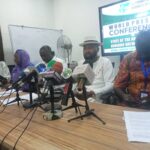Why Nigeria needs to intensify support, invest in data centres – NCC
By Funmilola Gboteku/ Stellamaris Ashinze
The Nigerian Communication Commission (NCC) says it is imperative for the country to sharpen its focus on broadband development and intensify support for data centre services to boost digital sovereignty.
The Executive Vice Chairman of NCC, Prof. Umaru Danbatta, said this on Thursday during the Telecoms Sector Sustainability Forum (TSSF) 4.0 organised by Business Remarks in Lagos.
The theme of the event was: “Mainstreaming Data Centres in the Nigerian Digital Economy.”
Danbatta, who was represented by Dr Sunday Atu, Head, Tariff Administration NCC, said mainstreaming data centres required collective efforts.
According to him, there is need for support to ensure data centres not only operate to guarantee national digital sovereignty, but also prioritise contents reflecting the country’s cultural norms, contexts and ideological values.
He said data was regarded as the new oil globally with increasing intensity in the context of the emerging digital economy.
For that reason, Danbatta explained that data had become a subject of special consideration by regimes, requiring appropriate structures and frameworks to truly tap and optimise the opportunities provided by this new order.
Danbatta noted that data centre services, no doubt, held the keys to the ultimate crystallisation of the new line of thinking within the ICT sector and by extension to the greater national economy of nations in so many ways.
“Recent developments point to the limitless treasure within this space. Africa has recently assumed a new frontier and compelling destination for global big tech players.
“Tech giants, like Google with its Equiano subsea fibre cable spanning 15,000 km from Portugal to South Africa and strategic landing points in Nigeria and Namibia, are expected to increase connectivity more than five-fold within Nigeria while creating an expected 1.6 million jobs.
“Meta, the parent company of Facebook, is equally on the threshold of launching its own subsea cable called 2Africa in 2024 to connect 16 African countries at an estimated cost of 1 billion dollars.
“It is targeted to generate close to 36 billion dollars of economic output within two to three years of operation.
“While these, no doubt, portend significant socio-economic impacts for Nigeria, they bring to the fore the debate around digital sovereignty and the need for national policy and regulatory frameworks to further localise traffic and data,” he said.
According to Danbatta, the global data centre market is worth billions of dollars, and Nigeria is well-positioned to attract a fair share of this investment.
He explained that by providing a reliable and secure environment for the services they offer within a well nurtured policy and regulatory framework, Nigeria would represent an attractive destination for more investment in data centre services and operations.
“With the commencement of the implementation of the African Continental Free Trade Area (AfCFTA), the role and critical nature of data centres become increasing overwhelming.
“This is underscored by the kind of efficiency derivable when critical resources are shared at costs far significantly smaller than the actual costs of setting up such resources from scratch,” Danbatta said.
He said this would provide a veritable platform for greater productivity for businesses and public sector entities to effectively harness the opportunities to be unlocked from the estimated 1.2 trillion dollars latent treasure within the AfCFTA block through its 1.3 billion people.
In his remark, the Chief Executive Officer of Medallion Data Centre Ltd., Ikechukwu Nnamani, said: “If we look at other parametres
Nigeria should be at the fore front of data centre industry in Africa.
“Unfortunately we are lagging behind and surprisingly African countries like South Africa and Egypt are way ahead of Nigeria.
He explained that from the Gross Domestic Product (GDP) point, broadband connectivity, and in terms of mobile subscription, Nigeria had significantly lower figures than other African countries.
Nnamani stressed the need for Nigeria to be put in its rightful position as the giant of Africa, not just in terms of population, but also in the area of quality of life of citizens, GDP and the digital benefits.
Also speaking , Bukola Olanrewaju, the convener of TSSF stressed the pivotal role data centres played in the digital era, saying beyond data storage and accessibility, they underpinned the digital world, fuelling economic growth, environmental sustainability and data security.
Olanrewaju said currently, there were only 86 colocation data centres in 15 African countries, with the majority concentrated in the big four African countries, which included South -Africa , Egypt, Nigeria and Kenya.
She said according to Allied Market Research, the global data centre market was valued at 187.35 billion dollars in 2020 and was anticipated to reach 517.17 billion by 2030.
According to Olanrewaju, data centres, alongside fibre optic broadband expansion and telecom towers, are poised to become the new backbone of Africa’s economic growth. (NAN)
Edited by Salif Atojoko
================
Published By
- Agriculture and Environment Desk Controller/Website Content Manager.
Has also recently published
 General NewsJuly 5, 2025Natasha’s reinstatement: NCSCN condemns call for protest, urges restraint
General NewsJuly 5, 2025Natasha’s reinstatement: NCSCN condemns call for protest, urges restraint EnvironmentJuly 4, 2025Group empowers young Nigerians for climate advocacy
EnvironmentJuly 4, 2025Group empowers young Nigerians for climate advocacy Economy/BusinessJuly 4, 2025Rebranding initiative to boost development, transparency – BPP
Economy/BusinessJuly 4, 2025Rebranding initiative to boost development, transparency – BPP General NewsJuly 4, 2025VON targets 500m Swahili listeners through partnership with Tanzania
General NewsJuly 4, 2025VON targets 500m Swahili listeners through partnership with Tanzania





